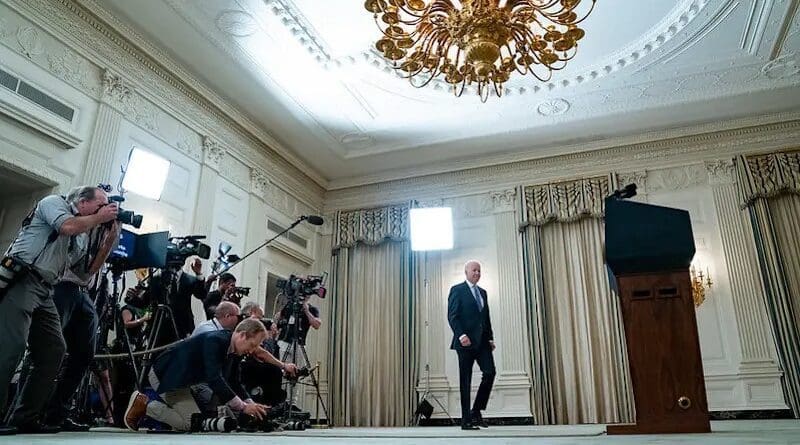Biden Pursuing Dangerous Policy Of Appeasement With Iranian Regime – OpEd
By Arab News
By Dr. Majid Rafizadeh *
In general, there exist two distinct approaches for dealing with the Iranian regime. There is the easy, but ultimately dangerous method, which involves submitting to the demands of the leaders in Tehran and placating them. And there is the effective path, which involves pressuring the Islamic Republic and holding it accountable for its violations and defiance.
Unfortunately, it appears that the administration of US President Joe Biden has chosen to take the easy but dangerous path. It seems to be appeasing Iran’s leaders in an effort to revive the Joint Comprehensive Plan of Action, also known as the Iran nuclear deal.
This appeasement has come in different forms. The administration first told the Iranian leaders that not only it is willing to lift nuclear-related sanctions, but that it is also considering lifting non-nuclear-related sanctions.
This was followed by the first concession toward Iran’s proxy militia group, the Houthis. Even as the evidence — including a report by the UN — showed that the Iranian regime was delivering sophisticated weapons to the Houthis in Yemen, the Biden administration suspended some of the anti-terrorism sanctions on the Houthis that the Trump administration had imposed. Soon after, the Biden administration revoked the designation of the Houthis as a terrorist group.
In addition, in June 2021 the Biden administration lifted sanctions on three Iranian former officials and several energy companies. Then, in a blow to the Iranian people and advocates of democracy and human rights — just a few days after the Iranian regime hand-picked Ebrahim Raisi to be its next president — the Biden administration announced that it was also considering lifting sanctions against Iran’s supreme leader, Ayatollah Ali Khamenei.
Most recently, the Biden administration shockingly issued a sanctions waiver for part of the Iranian regime’s nuclear program, which will permit companies from countries such as Russia, China and Europe to work on Iran’s non-proliferation projects such as the Tehran Research Reactor, electricity generation at the Bushehr Nuclear Power Plant, and the Arak heavy water production sites.
What has been the reaction of the Iranian regime to the Biden administration’s “goodwill” gestures during the past year? It has doubled down on its defiance, both regionally and internationally.
For example, while the Biden administration was giving the sanctions waiver for Tehran’s nuclear program, Tehran continued to violate all the restrictions of the nuclear deal, defying the international community by enriching uranium at a high and dangerous level and threatening that it is capable of enriching uranium up to 90 percent purity, which is weapons grade.
The regime is also violating some of the US sanctions that are still in place, along with UN Security Council resolutions. Its continuing efforts, for instance, to ship oil to Syria and Hezbollah in Lebanon are a direct violation of the US sanctions. The frequent shipments of weapons to the Houthis in Yemen are yet another violation by Iran of UN Security Council Resolution 2140: The “obligation to freeze all funds, other financial assets and economic resources that are owned or controlled, directly or indirectly, by the individuals or entities designated by the Committee, or by individuals or entities acting on their behalf or at their direction, or by entities owned or controlled by them; no funds, financial assets or economic resources to be made available to or for the benefit of such individuals or entities.”
It is worth noting that the Iranian regime has also been emboldened to escalate its crackdown on its own population. For example, in one of the latest waves of protests, in November 2021, many demonstrators rose up against the Islamic Republic, poured into the streets and criticized government officials over a severe water shortage. In response, the regime cut off access to the internet, and security forces fired shotguns and tear gas at protesters, intentionally targeting their heads and eyes, according to reports. The result, not surprisingly, was a number of deaths and hundreds of injuries. As #BloodyFriday trended on Twitter, not a word of condemnation could be heard from the White House, unfortunately.
More recently, the US Department of Justice announced on Dec. 7, 2021, the successful forfeiture of two large caches of Iranian weapons. The hauls reportedly included advanced arms including “171 guided anti-tank missiles, eight surface-to-air missiles, land-attack cruise missile components, anti-ship cruise missile components, thermal weapon optics and other components for missiles and unmanned aerial vehicles (drones).”
The US Navy also seized Iranian petroleum products from “four foreign-flagged tankers in or around the Arabian Sea while en route to Venezuela. These actions represent the government’s largest-ever forfeitures of fuel and weapons shipments from Iran.”
In a nutshell, an informed and effective policy to deal with the Iranian regime’s threats ought to be anchored in imposing pressure on the Islamic Republic. Appeasement will only embolden the Iranian regime and further destabilize the region.
- Dr. Majid Rafizadeh is a Harvard-educated Iranian-American political scientist. Twitter: @Dr_Rafizadeh

